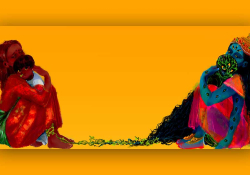Black Cadillac

In this story from Milena Solot’s manuscript A Possible Place, the recently named matron of a successful whorehouse in Mexico City walks into the car with her driver, Claudio, after the funeral of her father. As they drive through town and the scenery changes, Claudio remembers fragments of their life growing up together in the whorehouse and under the vigilance of “father.” Part of a series of interconnected short stories that deal with the plight of Honduran migrants and their journeys through Mexico, most of the characters come from the city of San Pedro Sula, and they are either running away from the Mara Salvatruchas or have lost their families at the hands of this gang.
She’s at the top of the green slope. She’s alone at the grave. She’s dressed in black. The others have left in groups of three or four, a few at a time. I can’t tell if she’s laughing or crying. I’m sure she’s telling the black, jumbled earth: you son of a bitch, I hope you rot like roadkill. She tells it: I hope you burn in hell, you bastard. She says: goodbye, sweet Papi.
She looks like a dry trunk. Her. Maybe it’s the light striking her sideways and the fact that she’s leaning forward, as if she were about to fall right into the hole with the Old Man.
But she won’t.
No.
I wonder what she thinks, the woman, of me. Maybe she doesn’t know I’m here, smoking this cigarette, stretched out in the car. Watching her. I’m just like this black Cadillac. I’m just like the shadow of that tree. I’m a tree. I’m a car. She will walk to the car. Her. But she won’t cry.
She’ll wear the veil all afternoon. She’ll smoke out of the side of her mouth. I’ll study her mouth in the rear-view mirror, long and curved and red, and I’ll listen to the bracelets jangling on her wrist. Once in a while I’ll smell her perfume, that one, the Chanel she always uses.
She’s coming.
She’s here.
Her.
Claudio, she tells me, Claudio, remember when we met? Her mouth twists into her sideways smile, the cruel one. Now I’m the one who gives the orders, Claudio, and this whole bunch of pricks will have to learn to respect me. Let’s get out of here. It smells like a dead man. Let’s go, we’ve got a lot of work to do.
Madame. Yes. Madame.
Before. Slower. When we met, Madame said. Before.
Then I remember.
A little girl’s injured hand. Startled eyes. Too round, I always thought. Too steady.
Slower.
It was raining, or about to stop raining, or else the air contained that sense of coming-storm. The Old Man was driving along the narrow highway. My legs dangled from the seat, but I could see the water sweeping back and forth across the windshield.
But why are we stopping, Sir, my father had asked the Old Man. Because you don’t see a little girl walking alone in the street and just keep driving, because you stop, you ask where her father is, and her mother, because if she doesn’t answer you invite her to get into the car, you promise her that everything is going to be fine.
Because you don’t leave a little girl alone in the street.
You. Him. The Old Man.
Her, the girl, in profile. Straight nose, pink lips, mud on her elbows. Below. Scraped knee. Dry blood. White dress, torn. What’s that she’s got around her neck? It’s gold. Hey, little one, where are you coming from so dressed up and pretty? Little one doesn’t talk. But she’s glad for the water, the bread, the milk. She accepts the clothes and falls asleep. Sleep, little one. Go to sleep. But first, tell me, how old are you? Where are you from?
Next morning in the kitchen, sun across the table. Little one beside me eating bread and jam. Drinking milk. What’s your name? Where are you from?
I’m the devil’s child, she says into my ear.
She whispers: I’m the devil’s child. My father is eating mangos.
One day you told me how you’d escaped. You talked about the window with its tin frame, the dry gardens, the reading room. You said they’d sent you there because they wanted to cure your cold heart. Your coal-heart. There. You said. In the place with the hidden clocks and lentil soup on Tuesdays, and where the old woman knits on the corner and murmurs the names of her dead children. There. Where the walls are slick with saliva, urine, phlegm, and where the elf who cleans the tables drips long threads of spit. And he cleans, you tell me. Forever. I wanted to know more, of course, like why your parents had taken you to the crazy house, but you smiled at me and said That’s too much. That’s too much, and you fell asleep, in my lap, like you used to do back then. I’d let you stay there for hours while I wondered how you’d managed to scale the wall so you could leave that white and yellow room, or whether the wound you had the day we found you was from your fall onto the other side, into the world. I wondered why they hadn’t searched for you and how much time had passed since you’d gotten away. You told me your name but then forbade me to use it. Azucena. Later you told me about a dream of a strange country where bad shadows live and I thought I’d lost you, but then I remembered you were only a child. A child who was suddenly and absolutely forced to stop being one.

I’d let you stay there for hours while I wondered how you’d managed to scale the wall so you could leave that white and yellow room, or whether the wound you had the day we found you was from your fall onto the other side, into the world.
I glimpse her legs in the rear-view window, crossed, stocky, muscular, better. She’s wearing her veil, Madame, but I can make out her mouth, almost smiling again. She smokes from the cigar box, of course; she can’t help it. But I know that under her clothes is still the little girl’s body that hasn’t let go, Madame, not entirely. Even though mere minutes after the Old Man died she ordered the entire house to call her Madame. I’m not a whore like you, she told the girls. Now I’m Madame. Anyone who doesn’t like it can leave this house, because it’s mine.
Hers. The Old Man loved her.
You were a princess, you told me, in a castle with a bad witch and a good witch. I saved the prince, you told me those nights. Oh, sweet girl, what prince? The Prince of the Shadow Country. But then you’d stop talking for days and months, and just when it seemed like you’d forgotten everything, you’d talk again. That’s who you were: a visitor from Fairyland, said the Old Man, and he’d call you my Little Red Riding Hood. He’d sit you on his lap. You’ll be the best puta, he’d tell you. You liked the sound of that. Being the best.
Red light. She’s stopped smoking. She leans her head back on the black leather seat and sighs. I’m tired, Claudio, you tell me, from where you sit. Is there a long way to go before we get there? No, Madame. Will everyone be home? you ask. Yes, everyone, Madame. And what am I supposed to do? Not much, Madame, cry. My feet are killing me, Claudio, pass me the bottle of vodka under the seat, Claudio.
Green. Go to sleep, Madame. It’s going to be a long night. And her legs open and she lets herself sink into the seat and I can barely hear her start to snore, but yes, Madame is snoring. I turn around in front to look at her face. My uniform bothers me; it’s too stiff at the limbs. A car passes on the right, slow. Another one. I go even slower. Madame.
Raindrops start to spatter and the streetlights along Avenida Revolución turn on prematurely. The rain will come and night will fall. And I thought it wouldn’t rain on the day of the Old Man’s funeral. It’s as if the universe were conspiring, as if every living thing were one of the Old Man’s puppets. It’ll rain. And I’ll watch her get out of the car, I’ll open an umbrella over her head, I’ll walk in step beside her to the door, and neither of us will say a word. The groups of mourners will be inside. And the kittens will slink around, their asses swaying, and no, they’ll say, the Old Man would like it that we’re toasting to him, to life, that we’re all here together.
I’ll watch her get out of the car, I’ll open an umbrella over her head, I’ll walk in step beside her to the door, and neither of us will say a word. The groups of mourners will be inside.
I don’t get this city, she says, as she sits up and wipes the saliva that’s started to crust around her mouth. I speed up and we pass a truck bearing crates of broccoli. A clown breathes fire at the next red light. It’s not raining any harder. The drops are sporadic. The clown lets out another mouthful of flame. He’s got two small children sitting on his shoulders. They sing. I’m bored.
I feel sorry for these people, she says, exhaling. Green. I accelerate. I shift into third and let the car speed up. Madame glances at herself in her silver mirror. She separates her eyelashes with the head of a pin. She takes out a tube of lipstick, paints it on. A fresh whiff of Chanel wafts through the car.
I’ll come to the Old Man’s room in the middle of the night. I’ll look at his things, his jackets, his ties, the flip-flops he showered in every morning. I’ll find the cigar box, the perfume bottle. The ashtray infested with crushed cigarettes. I’ll find him in the photos on the walls and I’ll pause, as I always do, before the photo of Azucena in her green dress. It’s a simple picture, but it intrigues me somehow. Maybe it’s because that’s the night Aurora became just another kitten in this house. The initiation ceremony, the Old Man called it.
You led me to the anthill hidden among the leaves of some green plant growing in the garden. You asked if I liked them, then you picked up a few and ate them. You wanted to know if it was my first time and I said no. Do you still wake up at night feeling like your skin is covered in ants? Ants, you said. They drill into your insides because you’re made of dirt. I’m an anthill in there, you said. Did you know that?
Sun.
You ask what time it is; you want to know if we’re running late. No, Madame, we’re right on time. Well, maybe a little late.
When did we stop speaking to each other? When you turned into Madame and I became the car, the tree?
I know, we can’t be late. Here, more vodka, Madame. You drink. You ask for the time again. You want to know if I think you’ll be a matron worthy of respect. Yes, Madame. Yes. Everyone will be there, they’re waiting for me, the sharks are going to strike. Drink, Madame. Drink.
The car comes to a halt. We hear singing. A procession approaches and a gold-painted woman’s face peers into the car window. She raps on the glass. Spare some change for something to eat, spare some change, she says, and she drifts into the passageway formed by the cars paralyzed by traffic. We watch the stoplight shift from green to yellow to red, from green to yellow to red, but the cars don’t move, and Madame, where are you going? To tell these sons of bitches to let us through, goddammit, because it’s not every day you bury your father. Madame. But she’s gone, and I have no choice but to get out of the car with her. The honks keep me from hearing her, if she’s saying anything at all.
We’ll be there soon, among the procession, among the people carrying bloody Christs, among the nasal pleas for eternal salvation. The crucified are coming up behind us. The men on their knees. Sinners. Let us through, shouts Madame. Sinners. She shouts amid the tumult, but the pilgrims only fix her with their compassionate stares. Madame commands them to go fucking pray somewhere else, because she has to get through, because her father died today. The bodies move around her like shadows. Deliver us from evil, Lord.
The crucified are coming up behind us. The men on their knees. Sinners. Let us through, shouts Madame.
The people shift like mud around her. Madame. Don’t do this. Madame. She lights one of those long menthol cigarettes she’s taken to smoking. She takes a drag and exhales the smoke in an aimless cloud.
Her.
There’s no way out of here, she says, and melts into the crowd, but I follow the long, curved shape of her. I won’t let her out of my sight. Ever. If there’s anything I promised the Old Man, it’s that. Madame turns the corner and we suddenly find ourselves on a desolate street. I’m at her right. This will never end. The pilgrims will be followed by the parade, and then—what does it matter? Madame, please stop, I beg her, and she stops. But neither my voice nor my plea is what makes her do it.
Her bedsheets smell like violets and her nightshirt gives off a faintly acrid smell that gets bitterer but stays sweet.
Madame has gone into a bar with large flat-screen TVs hung from the ceiling. They’re showing the news. She sits at the bar. She’s ordered a whiskey; she’s crossed her legs. Has she forgotten? Madame. Shhh, Claudio, I’m trying to listen. Shhhh. Silence.
SHE RECOGNIZES SOMETHING in that square-jawed, unibrowed face. Vicente Sandoval, says the broadcaster, has been arrested. But I’m distracted by the waiter, who asks if I’d like something to drink. I feel Madame’s body go slack at my right and her red-blotted cigarette falls to the floor. I stamp it out with the tip of my shoe. A group of businessmen and secretaries come into the bar, whistling and singing. They crowd around the corner table. Someone digs an elbow into me as he shouts, Six Cubas!
She’s gone, leaving her empty glass on the counter. I find her outside on the corner. Where are you going, Madame? You know you can’t be out here by yourself. Shut up, Claudio. I can do whatever I want.
The car’s over here, Madame, please, come with me. But she’s transformed. Scraggy dogs dash out from somewhere, terrified. And a rat’s red eyes peer out through a pair of garbage bins. A baby caterwauls in the distance. Someone shouts, Motherfucker! Soon we’ll reach the Callejón de la Soledad. It’ll be dark, and three songs’ melodies will merge in the air. The windows will be hung with colored lights, but Madame will stop in front of the woman with the black mole on her cheek and her braids threaded with ribbons, and the woman will tell her: Let me read your fortune, pretty girl. Here. Let’s see that hand. Here. And Madame won’t know how to refuse, and she’ll hold out her palm to the witch, who will tell her: You’ll die alone, pretty girl. The witch will let out a burst of laughter and she’ll vanish behind a curtain of bright cloth. The witch will have stolen her gold bracelet. Madame says nothing.
Let’s go, I plead. We have to get out of here. Do you have any idea where we are? But Madame only answers, We’re going to see the kittens on Soledad. Sometimes there’s a jewel in all the filth, Claudio.
What about that one? says Madame, gesturing to a brown-skinned girl with skinny legs and a purple miniskirt. But Madame, she can’t be any older than twelve.
You don’t leave a little girl alone in the street. Go on, ask her price.
♦
SHE'S AT THE TOP of the green slope. She’s alone at the grave. She’s dressed in black. The others have left in groups of three or four, a few at a time. She isn’t crying.
Translation from the Spanish
Finding the Rhythm by Milena Solot
Asked to provide a playlist of songs to accompany her story “Black Cadillac,” Milena Solot provided three that inspired her because of the rhythm she was hoping to find in the text.
“Petit Pois,” by Solo and Indré. The song moves always forward, but suddenly, without warning, it halts. It may then seem that the song will continue with its course, but it takes a different path. This was the premise in “Black Cadillac.”
In “Infinite Nature,” by Sebastian Zawadzki, sounds seem to never end. Claudio’s voice, the narrator, attempts this tone: he moves slowly, quietly, and deeply in a noisy, chaotic world.
“Is Anything Wrong,” by Lhasa de Sela, inspired the encounter the matron has with the girl in the alley—as if she had found herself as a child and asked: Is anything wrong? Is anything right?












